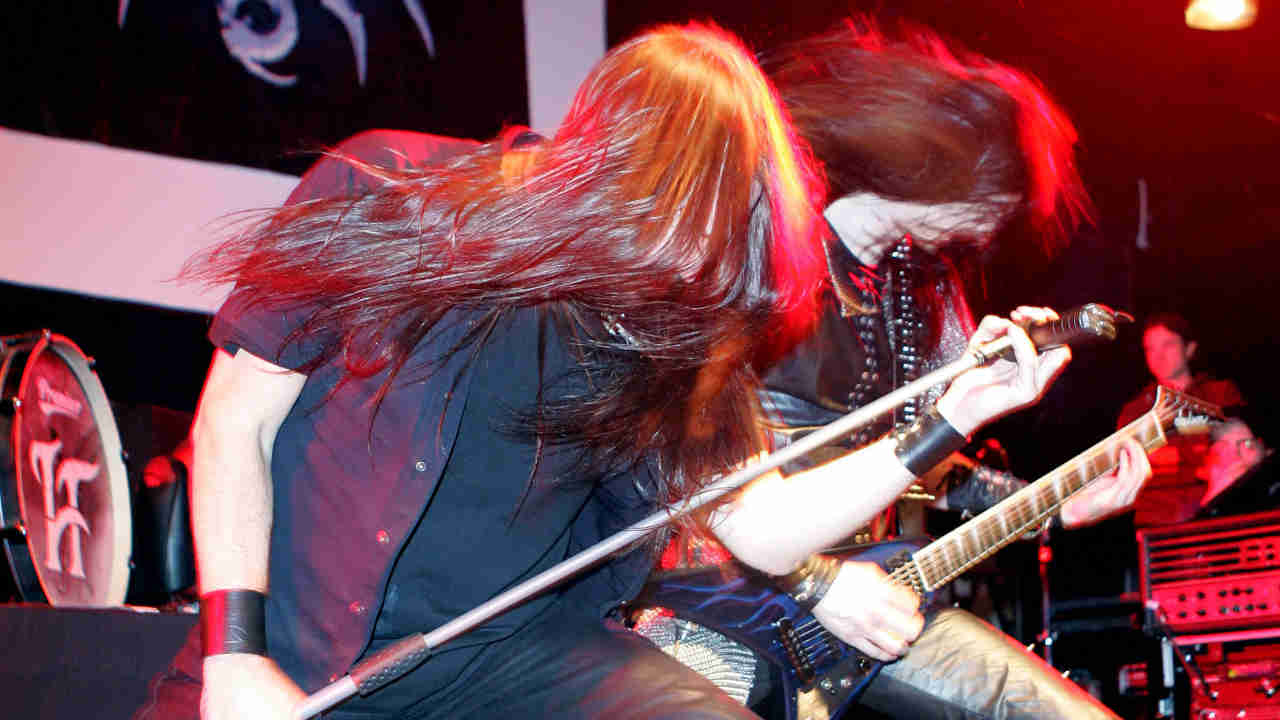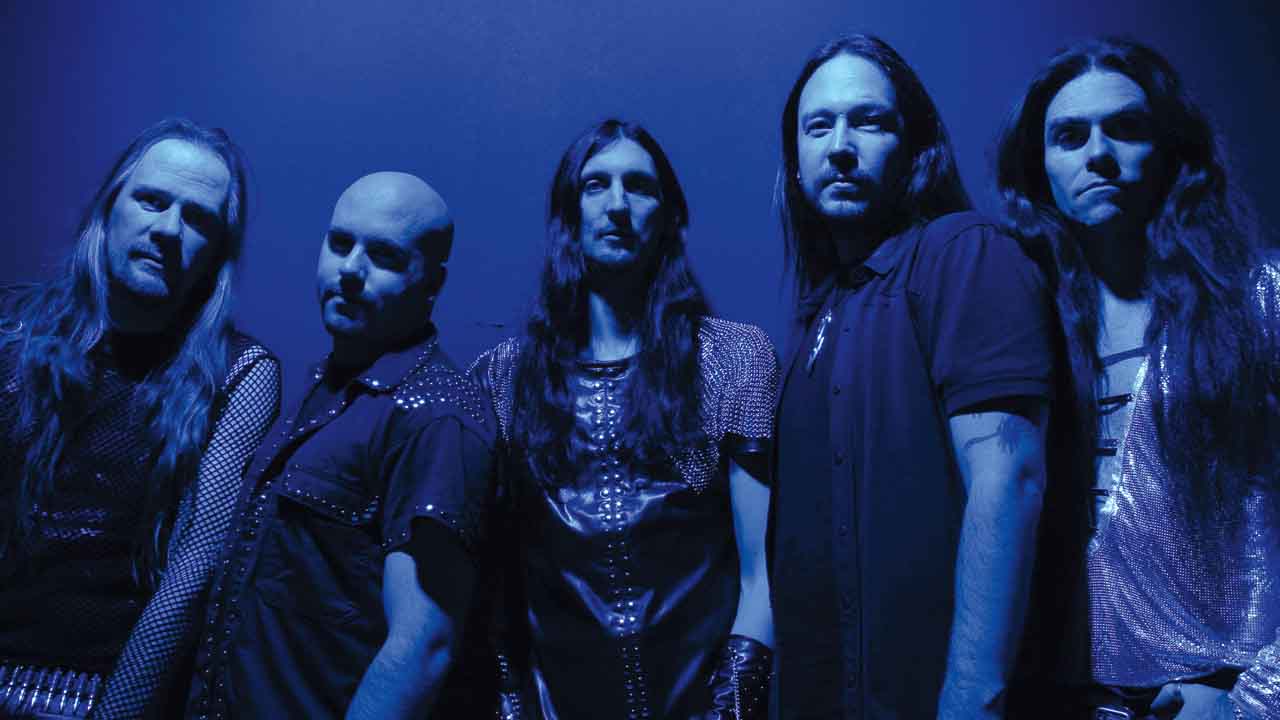By the time Hammerfall released Hearts On Fire in 2002, they had already become an unlikely success story, channelling their passion for classic heavy metal into international chart success and a legion of diehard fans. Yet five years earlier, when they released their debut Glory To The Brave, things couldn’t have looked more different. The tides of heavy metal had changed immeasurably from the genre’s heyday; the arena-filling, PMRC-baiting behemoths of the 80s had been slain by a new generation of rock stars clad in plaid, the entire genre undergoing an alternative reinvention so it could survive the nihilistic ‘kill yr idols’ zeitgeist of the 90s.
“Hammerfall were pretty far from the popular metal of the time,” admits founder and guitarist Oscar Dronjak, his voice laced with the dry amusement of someone who has had the last laugh. “When we formed it was more rhythmic aggressive stuff like Korn, Machine Head and Pantera. Of course, in Gothenburg we also had this huge death metal thing going on, but as far as heavy metal went, it was pretty dead at the time.”
Oscar is of course referring to Gothenburg’s legendary melodeath scene of the mid-90s. The successive releases of At The Gates’ Slaughter Of The Soul, Dark Tranquillity’s The Gallery and In Flames’ The Jester Race had drawn attention to the incredible talent within the Swedish city’s metal scene. But even that couldn’t gloss over the fact Hammerfall were playing the kind of music many metal fans (and publications) were studiously trying to distance themselves from.
“There was definitely some snickering going on whenever we actually played a show,” Oscar says. “People would be like, ‘Oh yeah, I used to love heavy metal but now I’ve grown up!’ or whatever. But from the beginning the idea was that Hammerfall were a heavy metal band and we should look the part; wearing leather, spikes and studs. People felt we were taking the piss – nobody thought a band would be dumb enough to do what we did in ’95!”
This steadfast dedication to the classic heavy metal aesthetic paid off when their 1998 follow-up, Legacy Of Kings, gave the band their first taste of chart success internationally. The record peaked at No.15 at home in Sweden, but also in Germany – no doubt helped by the fact the band made their international live debut at the country’s own Wacken Open Air on August 9 1997, followed by a continental tour of Europe alongside NWOBHM legends Raven and Tank. Hammerfall’s third record, Renegade, saw this success grow larger still; peaking at No.1 back home, the band were no longer plucky underdogs but champions in their own right.

But if the pressure was on, the band certainly weren’t letting it get in the way of having a good time. “We decided to go somewhere with nice weather for once to record part of the Crimson Thunder album and ended up in Tenerife,” Oscar says. “I was there for six weeks and it was a little bit taxing by the end, especially because there was nothing to do!”
Boredom aside, the sea, sand and sunshine of the island provided a perfect locale for the band to write their biggest single to date. Like a song out of time, Hearts On Fire captured the stirring thunderous nature of 80s stadium-fillers, bridging the gap between the likes of Journey or Europe and Metallica. While emblematic of the gloriously bombastic brand of heavy metal Hammerfall had plied to that point, the song’s deceptively simplistic chorus proved infectious, having fans roar along enthusiastically within the first couple of listens. But beneath its cheesy veneer the song also provided poignant lyrical content – lines like ‘We saw the writings on the wall / When heathens ruled above us all’ and ‘For years shunned by society / Outcasts, condemned for our beliefs / Our legions grew in secrecy’ that could just as soon describe Hammerfall’s ascent to that point.
Released in September 2002 (almost exactly a month before Crimson Thunder’s release on October 28), Hearts On Fire just missed a Top 10 spot on the Swedish singles charts as it peaked at No.11, but still landed as Hammerfall’s best-selling single at that point. Unfortunately, Hammerfall’s increased success and profile was tempered by an ever-more vitriolic counter-movement led by trolls who were offended by the band’s very existence. Things would come to a head a couple of days before the band were due to film the music video for their new single; while on a night out with his girlfriend at Daily’s in Gothenburg, Hammerfall vocalist Joacim Cans was accosted by one of the aforementioned trolls.
“Joacim had been harassed by a guy in a black metal shirt who followed him around all evening,” Oscars explains. “This guy and his friends wouldn’t let up and started to attack his girlfriend too, pushing her around and whatever. Joacim stepped in to intervene and one of the guy’s friends came at him from behind and smashed a glass in his face. Then they all ran away like scared rats.”
Joacim was left in a pool of blood. His injuries were extensive but, luckily, largely superficial. “He was millimetres from losing the eyesight in his left eye,” Oscar says darkly. “Joacim had to have plastic surgery for, like, six hours; these days you can’t really see the scars as they did such a good job, but when the video was filmed he had a black eye and all these scars covered with skin-coloured tape. It’s so insane someone would do something like that just because they don’t like our music.”
This wouldn’t be the band’s only bout of bad luck during the Crimson Thunder cycle. Almost a year after Joacim’s attack, Oscar would be involved in a motorcycle accident that forced the band to cancel some dates. There were also mixed emotions that arose from their first tour of the US, supporting heavy metal icon Dio.
“That was an incredibly cool tour in some ways, but frustrating in others,” Oscar says. “Hammerfall weren’t very big in North America at the time and we saw it as an enormous opportunity. What we hadn’t realised was the tour was actually Dio and King’s X, with us opening. We didn’t know how touring in America worked – that you had to fight for every inch onstage or whatever – and some shows like New York, LA etc were really huge, but there were loads as well in small clubs where we couldn’t even get our gear onstage.”
Throw in shows where they played before the stated opening time of the venue as printed on tickets (“not enough people to fill a row in front of the stage,” Oscar sighs) and an incident where a tour manager absconded with the band’s hard-earned money and it’s not hard to see why the band would feel negatively about the tour. But even with these setbacks they powered on, approaching the end of the Crimson Thunder cycle by recording a DVD back home in Gothenburg on February 20, 2003 (released later that year as One Crimson Night).
“Recording in our hometown meant a lot to us,” Oscar fondly says. “We recorded the show at Lisebergshallen – somewhere I’d actually seen other bands play many times – and it was a big deal to play that venue, though I’ll admit it was probably not the best idea to be recording the DVD towards the end of a very long tour! But it still went great and we had a Gold Album reception as part of the show where we were presented the record onstage. Renegade took about a year to go Gold – for Crimson Thunder it was just a couple of months.”
With the tour cycle over, the band set to work on their next record [2005’s Chapter V: Unbent, Unbowed, Unbroken] and it appeared the story of Hearts On Fire was complete. Or at least, it was until 2006 when the band were contacted by the Swedish national women’s curling team, looking for a song that could give them a rock’n’roll look going into the Turin Winter Olympics. “There had been an article published that basically said ‘curling isn’t rock’n’roll’ and they decided to change that!” Oscar laughs. “Hearts On Fire was already a big song for us so we could just have lots of fun with it.”
Doing just that, the band filmed a new music video (thankfully this time without incident) – a gloriously batshit scenario where the curling team take to the ice to go head-to-head with the band (plate body-armour and all) like a fever-dream mash-up of Blades Of Glory and Airheads. As it turns out, 80s movies were right: the right musical montage really can make you a winner… “After the Olympics we spoke to the team and they said they’d listened to Hearts On Fire every day before they went out on the ice,” Oscar says proudly. “They won the gold medal too; that’s as close to Olympic gold as Hammerfall will ever get!”
Published in Metal Hammer #343

